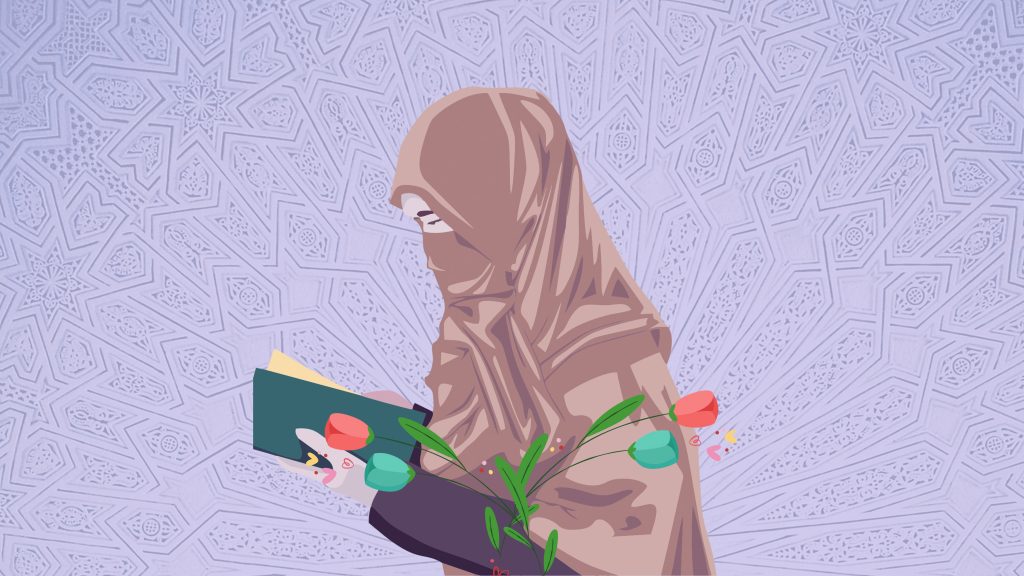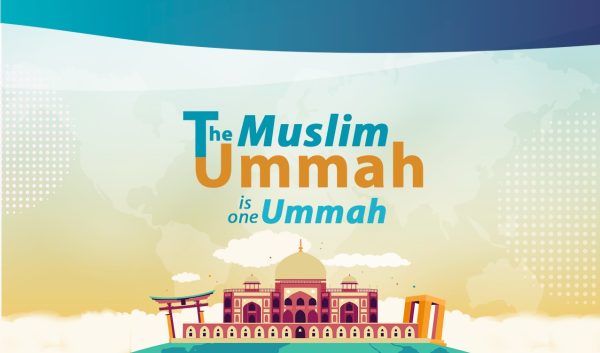
I am a Muslim woman. I am protected by my father, my brother, my husband and my son. The men in my life have been commanded by my Creator to stand like a wall for me warding off all things that may harm me. I am honored by Allah (عَزَّوَجَلَّ) in a way that is respectable, lovable and shows me I am valuable.
An entire Surah has been revealed under my name – Surah An-Nisa (The Women). This-not only protects my rights but also clearly gives the men of understanding insight as to my position in the society which has been ordained by the Creator Himself. No questions are to be asked. These commands are to be followed. Surah Al-Ahzab and Surah An-Nur lay out the foundation as to how I am to guard my chastity and honor. It is not a burden. Rather, it is a relief of a burden of shame and regret that may follow otherwise if I expose myself to the dangers out there that leave me unfortified.
Women in Islam as Role Models
My behavior has been defined by my mothers – the Ummahatul Mu’mineen and the Sahabiyat. These were the ones who have laid down the script of how women should be in a society. Nothing stopped them and nothing stops us as long as it is in the framework of that protective ground defined for us by Allah (عَزَّوَجَلَّ). Here are a few of the many women in Islam that were full of character and zeal.
Khadjia bint Khuwalid (رَضِيَ ٱللَّٰهُ عَنْهُ), a top businesswoman, made her own decisions and was firm on them. She was the first lady of the completely new ideology of Islam. She chose to support her husband’s mission and stood by him in all circumstances.
Ayesha bint Abi Bakar As-Siddiq (رَضِيَ ٱللَّٰهُ عَنْهُ) was a woman of substance, intelligent with immense knowledge of deen. She held a personality that was strong, bold yet submissive to Allah (عَزَّوَجَلَّ). I see her resolve in the incident of Ifk (The Slanderous Lie), where she stood determined and not breaking under pressure. Although a young girl, she showed exemplary maturity. She kept her composure and managing her hurt with these words only when her husband, the Prophet ﷺ came to her for verification.
قَالَتْ فَلَمَّا قَضَى رَسُولُ اللهِ صلى الله عليه وسلم مَقَالَتَهُ قَلَصَ دَمْعِي حَتَّى مَا أُحِسُّ مِنْهُ قَطْرَةً، فَقُلْتُ لأَبِي أَجِبْ رَسُولَ اللهِ صلى الله عليه وسلم عَنِّي فِيمَا قَالَ. فَقَالَ أَبِي وَاللَّهِ مَا أَدْرِي مَا أَقُولُ لِرَسُولِ اللهِ صلى الله عليه وسلم. فَقُلْتُ لأُمِّي أَجِيبِي رَسُولَ اللهِ صلى الله عليه وسلم فِيمَا قَالَ. قَالَتْ أُمِّي وَاللهِ مَا أَدْرِي مَا أَقُولُ لِرَسُولِ اللهِ صلى الله عليه وسلم. فَقُلْتُ وَأَنَا جَارِيَةٌ حَدِيثَةُ السِّنِّ لاَ أَقْرَأُ مِنَ الْقُرْآنِ كَثِيرًا إِنِّي وَاللَّهِ لَقَدْ عَلِمْتُ لَقَدْ سَمِعْتُمْ هَذَا الْحَدِيثَ حَتَّى اسْتَقَرَّ فِي أَنْفُسِكُمْ وَصَدَّقْتُمْ بِهِ، فَلَئِنْ قُلْتُ لَكُمْ إِنِّي بَرِيئَةٌ لاَ تُصَدِّقُونِي، وَلَئِنِ اعْتَرَفْتُ لَكُمْ بِأَمْرٍ، وَاللهُ يَعْلَمُ أَنِّي مِنْهُ بَرِيئَةٌ لَتُصَدِّقُنِّي، فَوَاللهِ لاَ أَجِدُ لِي وَلَكُمْ مَثَلاً إِلاَّ أَبَا يُوسُفَ حِينَ قَالَ {فَصَبْرٌ جَمِيلٌ وَاللَّهُ الْمُسْتَعَانُ عَلَى مَا تَصِفُونَ} ثُمَّ تَحَوَّلْتُ وَاضْطَجَعْتُ عَلَى فِرَاشِي،
When Allah’s Messenger (ﷺ) finished his speech, my tears ceased flowing completely that I no longer felt a single drop of tear flowing. I said to my father, ‘Reply to Allah’s Messenger (ﷺ) on my behalf concerning what he has said.’ My father said, ‘By Allah, I do not know what to say to Allah’s Messenger (ﷺ).’ Then I said to my mother, ‘Reply to Allah’s Messenger (ﷺ) on my behalf concerning what he has said.’ She said, ‘By Allah, I do not know what to say to Allah’s Messenger (ﷺ).’ In spite of the fact that I was a young girl and had a little knowledge of Qur’an, I said, ‘By Allah, no doubt I know that you heard this (slanderous) speech so that it has been planted in your hearts (i.e. minds) and you have taken it as a truth. Now if I tell you that I am innocent, you will not believe me, and if confess to you about it, and Allah knows that I am innocent, you will surely believe me. By Allah, I find no similitude for me and you except that of Yusuf’s father when he said, ‘(For me) patience in the most fitting against that which you assert; it is Allah (Alone) Whose Help can be sought.’
(Sahih al-Bukhari 4141)
Maryam (عَلَيْهِ ٱلسَّلَامُ) was selected to face society all on her own and given the courage to do so by being placed in an unprecedented circumstance of bearing a child without a father. Her selection is from the Creator Himself.
وَإِذْ قَالَتِ الْمَلَائِكَةُ يَا مَرْيَمُ إِنَّ اللَّـهَ اصْطَفَاكِ وَطَهَّرَكِ وَاصْطَفَاكِ عَلَىٰ نِسَاءِ الْعَالَمِينَ ﴿٤٢﴾۔
And [mention] when the angels said, “O Maryam, indeed Allah has chosen you and purified you and chosen you above the women of the worlds.
[Aal Imran: 42]
Umme Sulaim Bint Malhan (رَضِيَ ٱللَّٰهُ عَنْهُ) displayed beautiful patience upon the death of her son and withheld robustness, which for a woman who is deemed weak and frail is marvelling. Asiya (عَلَيْهِ ٱلسَّلَامُ)’s perseverance under intense oppression and injustice under a tyrannical husband has been rewarded dearly by Allah (عَزَّوَجَلَّ) with her mention being preserved in the verses of the Qur’an.
وَضَرَبَ اللَّـهُ مَثَلًا لِّلَّذِينَ آمَنُوا امْرَأَتَ فِرْعَوْنَ إِذْ قَالَتْ رَبِّ ابْنِ لِي عِندَكَ بَيْتًا فِي الْجَنَّةِ وَنَجِّنِي مِن فِرْعَوْنَ وَعَمَلِهِ وَنَجِّنِي مِنَ الْقَوْمِ الظَّالِمِينَ
And Allah presents an example of those who believed: the wife of Firaun, when she said, “My Lord, build for me near You a house in Paradise and save me from Pharaoh and his deeds and save me from the wrongdoing people.”
[At-Tahreem: 11]
Sumayyah bint Khayyat (رَضِيَ ٱللَّٰهُ عَنْهُ) was one of the first who openly defied the Quraysh leaders. She was the first martyr in Islam. Safiyah bint Abdul Mutallib (رَضِيَ ٱللَّٰهُ عَنْهُ), at the Battle of Trench, bravely defended the Muslims standing fearless and courageous by beheading a Jew and throwing his neck outside the fort to misguide the enemy in thinking the place is fortified when in fact it was not. She is said to be the first woman to have killed an unbeliever in the history of Islam.
We learn in the Qur’an that the father heard the opinion of his daughter after Musa (عَلَيْهِ ٱلسَّلَامُ) has helped the girls with obtaining water from the well, one of the daughters suggested he be hired.
قَالَتْ إِحْدَاهُمَا يَا أَبَتِ اسْتَأْجِرْهُ ۖ إِنَّ خَيْرَ مَنِ اسْتَأْجَرْتَ الْقَوِيُّ الْأَمِينُ
One of the women said, “O my father, hire him. Indeed, the best one you can hire is the strong and the trustworthy.”
[Al-Qasas: 26]
What do I learn for myself?
I learn that I hold a position in the society – a place that has been established with wisdom and authority. My feminity is a gem I hold that I do not intend to offer to the world without right. My rights have been given to me by my Rabb. I am special. I need not go out on the streets to yell and shout out for them holding up signs with obscene and shameful content. The very act of doing so is humiliating and disrespectful to my own soul. This is not how rights are forsaken.
Rights are a privilege. They are to be understood and implemented. Those who do not understand this will be the ones who are to be held accountable for it. I lose nothing at the end. All has been well explained in the verses of the Qur’an and manifested in how the Prophet ﷺ was instructed to deal with women.
We see this exemplary character of a man towards his wives, towards his daughters and with other women of society. Our Prophet ﷺ over 1400 years ago, had already taught the world the true value of women. We see him standing up in honor of his daughter, Fatima (رَضِيَ ٱللَّٰهُ عَنْهُ). Heﷺ understood the need of Ayesha (رَضِيَ ٱللَّٰهُ عَنْهُ)’s childish nature and allowing her the freedom to dwell in it. He was mindful of Sawda bint Zam’a (رَضِيَ ٱللَّٰهُ عَنْهُ)’s personality of being easily angered and decided to pray for it.
I learn that if the men in the society do not give me my right, I learn from the above examples to turn to Allah (عَزَّوَجَلَّ) and ask Him. Walking on the streets holding up a sign with meaningless and cheap content is not going to dignify my status as a woman in anyway. It is not going to offer me the respect that I duly deserve. Rather, it seems quite humiliating for me to want to do that-come out on the streets. I am ashamed to even quote the vulgar content that is displayed by women under the title of ‘International Women’s Day’.
Education has not taught me to do that. Knowledge of both the Deen and dunya has taught me to voice my opinion in an acceptable manner through an understood and decent form of expression. It has taught me that I abstain from actions that are far below my dignified self that lead to chaos rather than settlement of any kind. My ilm has taught me to be patient and to convey my thoughts powerfully with composure and kindness.
Women of the world and especially the Muslim women out there – think about your status as a dignified woman. You are far more special and precious to be walking around bellowing to be heard. You are far more honorable than what you would like to portray yourself as on the Aurat March this 2021. Please consider yourselves much worthier than to have to display ourselves in such a manner that is definitely not befitting for a modest, Muslim woman. Rise above this dangerous calling to so called ‘liberalism’. Stay home, stay safe.










